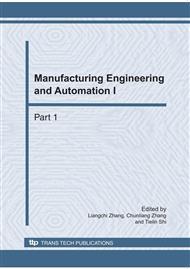p.1088
p.1093
p.1097
p.1101
p.1105
p.1109
p.1113
p.1117
p.1122
The Study on Framework and Functions of Integrated Design Environments for Preliminary Design
Abstract:
For complex product design, many software and tools are used, and large scale intermediate data with heterogeneous formats and complex relationships are produced in preliminary design. Efficient organization and management of data are very difficult. The integrated design environments(IDE) are useful to solve this problem. This paper gives an overview on IDE and some correlative key technologies. According to characteristics of preliminary design stage, a framework of IDE is put forward in this paper and the system function components are analyzed. The framework includes some innovative methodologies, such as task-drove design by workflow management, design tools and software seamless integration, and design knowledge templates. The realization of IDE is presented to illustrate the applicability of the new framework.
Info:
Periodical:
Pages:
1105-1108
Citation:
Online since:
October 2010
Authors:
Price:
Сopyright:
© 2010 Trans Tech Publications Ltd. All Rights Reserved
Share:
Citation:


